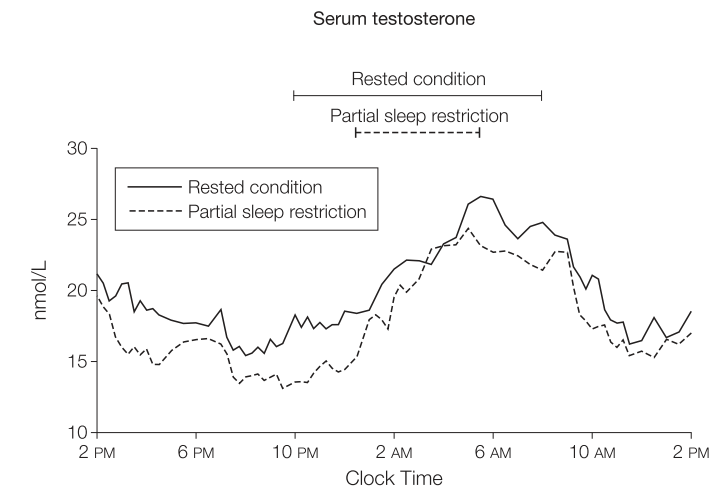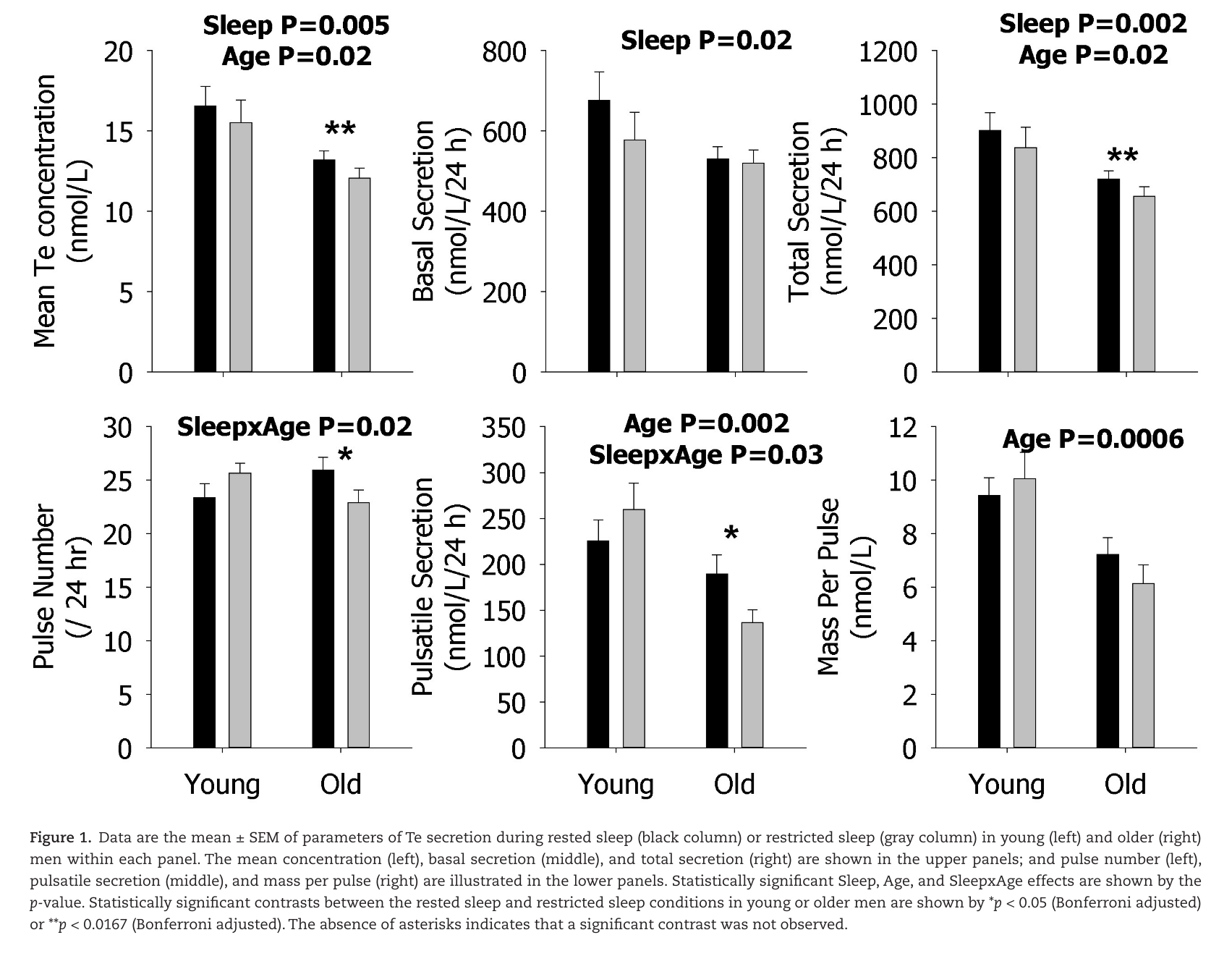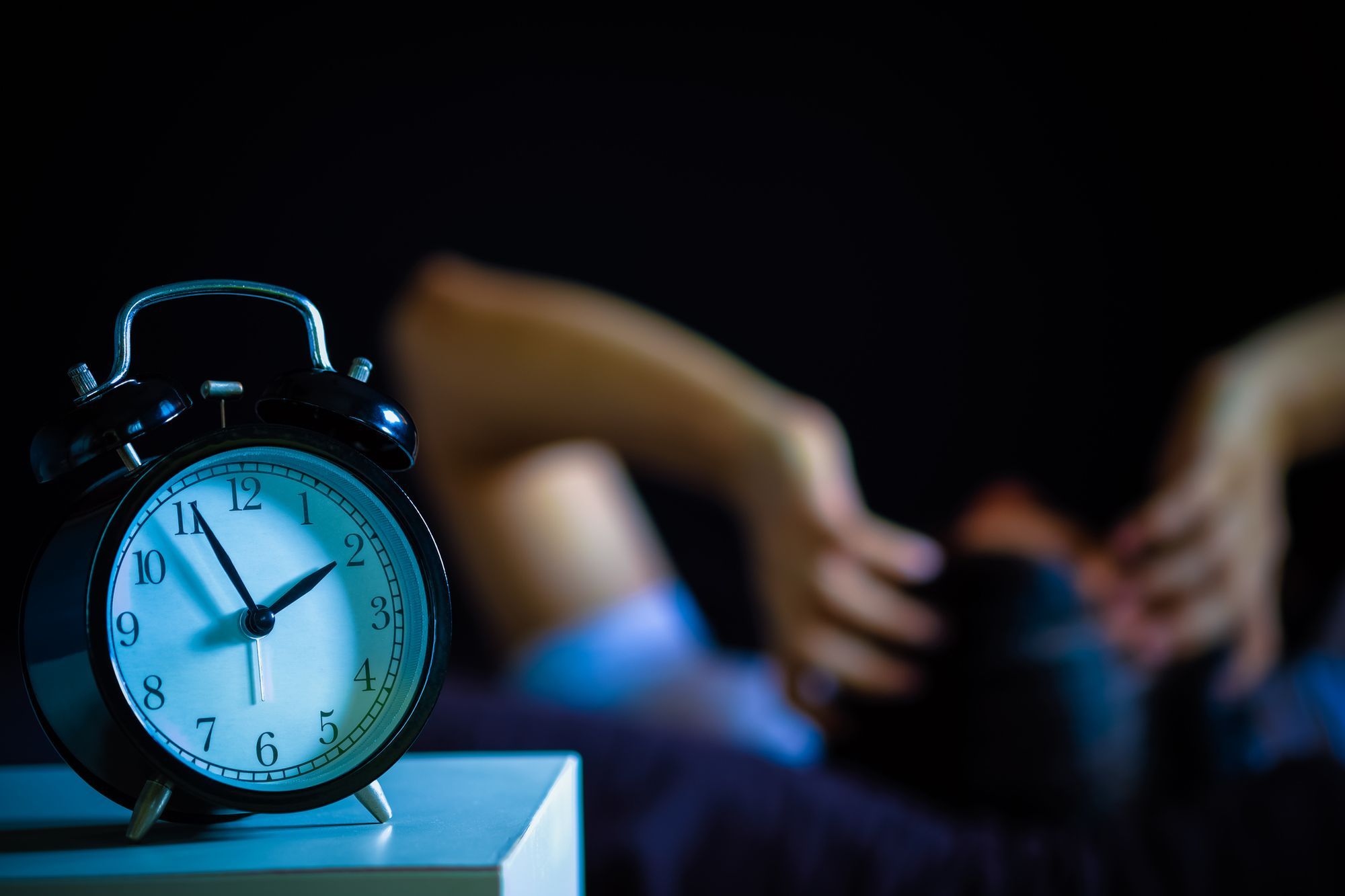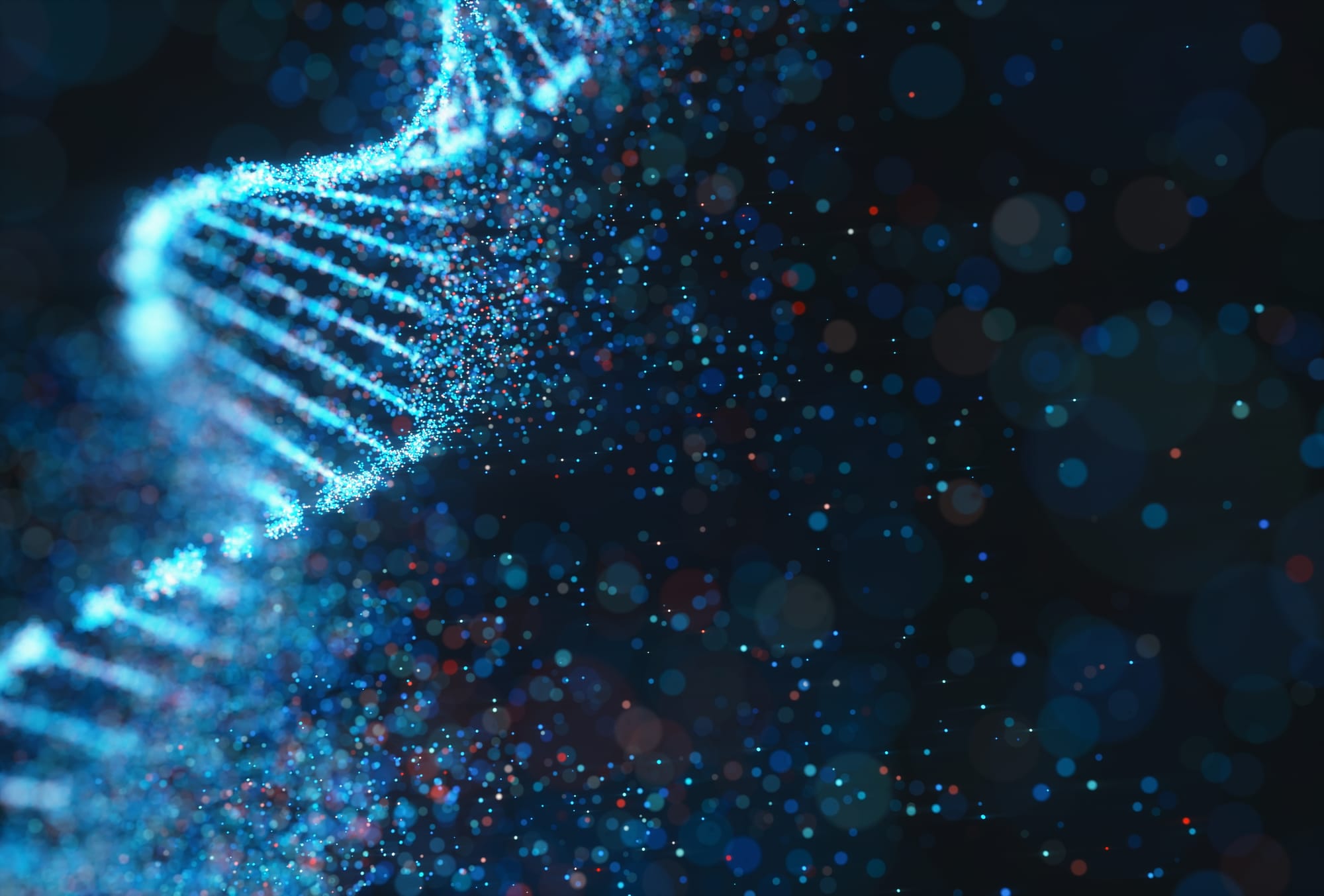Let me preface this with the sleep fanatics probably aren’t going to like this one and as we have discussed HERE five nights of low sleep is probably not a reason to lose your marbles and may not even significantly lower serum testosterone concentrations.
Leproult and Cauter [1] did find that one week of sleeping only 5 hours per night reduced the area under the curve (AUC) of testosterone by 10-15% in a convenience sample of 10 men, but as you can see from the figure below this would likely be quite difficult to pick up with a one point in time testosterone measurement.

A more recent 2019 study by Smith and colleagues [2] looked at both 5 nights of less than 4 hours of total time in bed and 6 weeks of delaying sleep by 1.5 hours and neither of these sleep restriction conditions resulted in significant changes in serum testosterone in healthy men age roughly 20-45.
“In the present study, neither severe and acute (<4 h/night for 5 nights) nor mild and chronic (1.5 h/night for 6 wk) sleep restriction significantly affected plasma testosterone levels in healthy young men.” –Smith et al., 2019
Given the current literature, I think we can quell the fear around a few nights of less than ideal sleep absolutely tanking testosterone. Even six weeks or so of staying up late may not be that detrimental to testosterone levels, but it would be interesting to see the AUC post-data like the figure below. I still feel strongly that we need more research on what five to six hours of sleep might do over multiple months and years, but in the real world and in observational research, it will likely be hard to untangle this from stress and a host of other confounders. Thus, we need more RCTs that are impossible to placebo control* and we need controlled research on how less than ideal sleep potentially relates to more applied outcomes like adaptations from training.
Now all-out sleep deprivation and severe sleep fragmentation do seem to lower total testosterone secretion and pulsatile activity, but probably not by as much as most people would think (perhaps by less than 10%) [3-5].

Obstructive sleep apnea (OSA) is also related to lower testosterone [6], but given the other comorbidities that cluster with OSA, it is hard to untangle causality here [7, 8].
The Endocrine Society Clinical Practice Guidelines [9] do list sleep disturbances as a causative agent in functional hypogonadism and there are certainly calls to screen all men with low testosterone for sleep apnea (for multiple reasons which we will talk about in the future) and more due diligence and informed consent are absolutely needed in the testosterone replacement (TRT) community as only 4% of men prescribed TRT seem to be assessed with recommended two-morning blood draws before starting TRT and 2/3 of men were not tested at all [10].
“Testosterone concentrations also are affected by age, obesity, diabetes, sleep disorders including obstructive sleep apnea (OSA), and health status. Therefore, assessing men for Testosterone deficiency should include a general health evaluation to exclude systemic illness, eating disorders, excessive exercise, sleep disorders, and use of recreational drugs and certain medications (e.g., opioids or high-dose glucocorticoid therapy) that affect Testosterone production or metabolism.” – Bhasin et al., 2018 [9]
I think to answer the question a bit more definitively we can look at the extreme of does treating Obstructive Sleep Apnea significantly increase serum testosterone?
The answer to this particular question at the present moment, perhaps surprisingly looks to be No [11] and you can read more for yourself at the following link - Effects of CPAP on Testosterone Levels in Patients With Obstructive Sleep Apnea: A Meta-Analysis Study.
Now, what could help both OSA and Low Testosterone in those living with overweight or obesity is body fat loss [12-15].
You might then intuitively be asking is it possible to lose body fat if one has low testosterone and/or obstructive sleep apnea?... which is a topic for another day.
TL;DR – I am absolutely pro sleep, but I am even more staunchly anti-fear. It does not appear that a few nights of bad sleep is going to obliterate testosterone concentrations. Complete sleep deprivation and severe sleep fragmentation do look to reduce testosterone secretion marginally especially in older males. It is hard to say if sleep apnea is causative in low testosterone, yet treating it does not seem to significantly increase serum testosterone, HOWEVER, there are a plethora of other health reasons to help people not run out of oxygen while they are sleeping and starting TRT has contraindications if someone already has OSA.
*These null findings are quite surprising to me given that the pro-sleep rhetoric and low sleep fear narrative are extremely pervasive right now and as researchers we may want to try to select people who don't have this confirmation bias lean as an exclusion criterion. IMO we kind of want to select the "sleep is a cousin of death and doesn't matter" crowd for these types of studies.
REFERENCES:
1. Leproult, R. and E. Van Cauter, Effect of 1 week of sleep restriction on testosterone levels in young healthy men. JAMA, 2011. 305(21): p. 2173-4.
2. Smith, I., et al., Sleep restriction and testosterone concentrations in young healthy males: randomized controlled studies of acute and chronic short sleep. Sleep Health, 2019. 5(6): p. 580-586.
3. Cote, K.A., et al., Sleep deprivation lowers reactive aggression and testosterone in men. Biol Psychol, 2013. 92(2): p. 249-56.
4. Liu, P.Y., et al., Age and time-of-day differences in the hypothalamo-pituitary-testicular, and adrenal, response to total overnight sleep deprivation. Sleep, 2020. 43(7).
5. Luboshitzky, R., et al., Disruption of the nocturnal testosterone rhythm by sleep fragmentation in normal men. J Clin Endocrinol Metab, 2001. 86(3): p. 1134-9.
6. Wang, H., et al., Obstructive sleep apnea and serum total testosterone: a system review and meta-analysis. Sleep Breath, 2022.
7. Wittert, G., The relationship between sleep disorders and testosterone in men.Asian J Androl, 2014. 16(2): p. 262-5.
8. Kim, S.D. and K.S. Cho, Obstructive Sleep Apnea and Testosterone Deficiency. World J Mens Health, 2018.
9. Bhasin, S., et al., Testosterone Therapy in Men With Hypogonadism: An Endocrine Society Clinical Practice Guideline. J Clin Endocrinol Metab, 2018.
10. Zhou, C.K., et al., Trends and Patterns of Testosterone Therapy among U.S. Male Medicare Beneficiaries, 1999 to 2014. J Urol, 2020. 203(6): p. 1184-1190.
11. Cignarelli, A., et al., Effects of CPAP on Testosterone Levels in Patients With Obstructive Sleep Apnea: A Meta-Analysis Study. Front Endocrinol (Lausanne), 2019. 10: p. 551.
12. Corona, G., et al., Body weight loss reverts obesity-associated hypogonadotropic hypogonadism: a systematic review and meta-analysis. Eur J Endocrinol, 2013. 168(6): p. 829-43.
13. Smith, S.J., et al., Examining the effects of calorie restriction on testosterone concentrations in men: a systematic review and meta-analysis.Nutr Rev, 2022. 80(5): p. 1222-1236.
14. Anandam, A., et al., Effects of dietary weight loss on obstructive sleep apnea: a meta-analysis. Sleep Breath, 2013. 17(1): p. 227-34.
15. Carneiro-Barrera, A., et al., Weight loss and lifestyle interventions for obstructive sleep apnoea in adults: Systematic review and meta-analysis.Obes Rev, 2019. 20(5): p. 750-762.






Related Content
What Would It Take To Really Map Out The Androgen Signaling Network?
Jan 23, 2026
How Does Sleep and Sleep Loss Affect Testosterone?
Dec 05, 2025
How Much Does Androgen Receptor Sensitivity Matter?
Nov 16, 2025